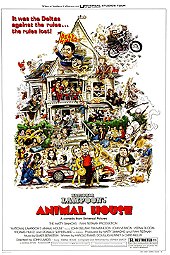At the time of its release in 1978, National Lampoon's Animal House was the most successful comedy in history; proving that crude humour could be just as lucrative as space opera and shark action. Additionally, just as Jaws and Star Wars gave birth to the brain-dead blockbuster pedigree, this classic film helped reshape the comedy genre, and influenced future comedies for decades to come (Porky's, Old School, and the American Pie movies, to name a few). Like all the greatest comedies in history, Animal House is timeless. Despite the film being aped ad nauseam for decades, the general style still feels oddly fresh, the main set-pieces remain very funny, and the movie as a whole has stood the test of time.
In terms of plot...well, there frankly isn't a solid plot to speak of - Animal House is simple in premise as it aspires to be one prolonged string of bad-taste fraternity gags which are underpinned by a fun, earnest party atmosphere. Set in the fictional Faber College back in 1962, the film essentially chronicles the rivalry between two student fraternities. The Omegas are rich, arrogant jocks who control the student council and win over all the pretty girls. Meanwhile, there's the Delta Tau Chi fraternity - a bunch of losers with appalling grades who hold court in their dilapidated frat-house and are interested solely in the excesses of rowdy young men (i.e. alcohol, drugs, and, of course, sex). The increasingly disreputable behaviour of the Deltas brings shame to the academic institution, and Dean Wormer (Vernon) will do anything to get rid of them. The Omegas, naturally, are eager to help.
The straightforward premise of Animal House is employed as a launch-pad for a fusillade of comedic set-pieces. There's hardly a dull moment as the film continuously moves from one iconic scene to the next. Such memorable sequences include the toga party and the disastrous homecoming parade. The humour varies wildly, from the delicate (the masterful end credits which reveal the fate of the protagonists) to the slapstick (the golf lesson) and the cartoonish (the virginal Larry, agonising over whether to rape his comatose date, is harangued by miniature angel and devil advocates). Animal House is by no means one long-lasting howl, and a few more juicy laughs would've been beneficial, but it still has its funny moments and it's never tedious. Helmer John Landis offers razor-sharp direction too. Landis had the right sense of humour and energy required to conduct this nuanced symphony of wild college antics.
The only real weakness of Animal House is that the film has literally no direction or purpose, though that's probably what made it work. The cast is a large ensemble with no true lead character or anchor, and the script (more or less comprised of vignettes) was thought to be a total mess. And yet, the film worked. Go figure.
It's a miracle that Animal House actually exists. Back in 1977, director John Landis and writers Harold Ramis, Douglas Kenney and Chris Miller were a bunch of young writers for a popular college magazine with no experience in the film industry. It was Ivan Reitman who eventually gave the boys the big break they needed. And even once the film was given the green light, it was difficult to hire top actors. An ensemble of predominantly unknown actors was assembled instead. Luckily, the film was a success, and it helped catapult a lot of the cast and crew to fame.
In the cast you'll find such names as Karen Allen (years before she appeared in Raiders of the Lost Ark), Tom Hulce (many years prior to Amadeus), and even Kevin Bacon in his film debut. The actors all played it funny, but played it real - they each embodied a character rather than a caricature (though the characterisations aren't that deep). Also in the cast is Stephen Furst as an overweight freshman nobody wants in their fraternity, Peter Riegert as an excessive drinker, Bruce McGill as the in-house biker, James Widdoes as the Delta House President, and Tim Matheson whose character acts like the intellectual backbone of the Delta group (especially when it comes to their ingenious schemes). However it was Donald Sutherland who made this movie possible to produce. Universal had been growing weary of the casting choices, and they were thinking of pulling the plug if they couldn't cast a famous actor of the time. Sutherland stepped in and had his scenes as Jennings (the erotic, pot-smoking professor) shot in two days. And in return he agreed to be paid $50,000 (instead of a percentage of the film's profits - which would have actually earned him a few million dollars).
Without a doubt, the standout of Animal House is the late John Belushi, whose performance here (along with his famous turn in The Blues Brothers) remains a jewel in his tragically brief career. The undisputed heart and soul of the movie, Belushi's scene-stealing, beer-swilling slob Bluto is the immoral hub of the Delta fraternity. Special mention must also be made of John Vernon as Dean Wormer. Vernon is patronising and authoritative; truly one of cinema's most quintessential villains.
In the decades since its release, National Lampoon's Animal House has developed into a pop culture milestone. Its gross-out humour is quite tame compared to its contemporary imitators and the movie is probably more of an exercise in nostalgia, but it remains one hell of a fun, highly amusing ride. And, like all great comedies, it keeps getting better with each new viewing.
8.2/10
 Login
Login